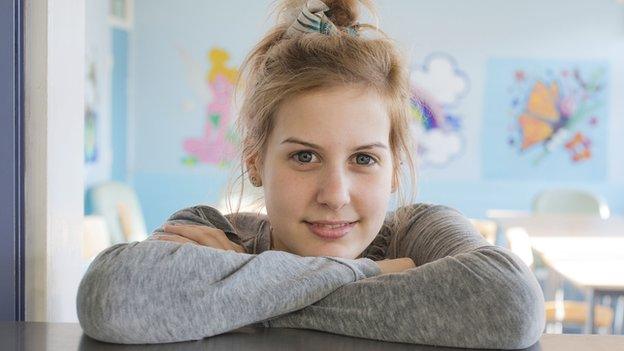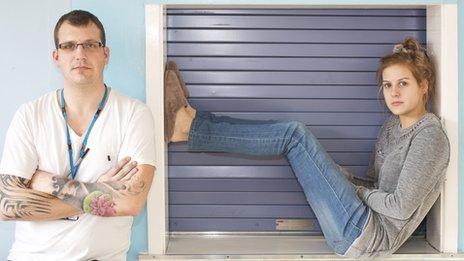Beth's story: What is it like to be sectioned?
- Published

For 18-year-old Beth, a battle with an eating disorder and depression led to her being sectioned under the Mental Health Act, but being detained against her will marked the start of her road to recovery.
"Loads of people just think, 'Oh get a Big Mac down you and you'll be fine,' but yes you might be physically underweight, but it's more mental. It's like you've got another person that's got inside your head and they've taken over you," says Beth.
"It's not you any more. It's them in charge and they say you're not allowed to eat, that you've got to exercise."
Beth has been battling an eating disorder since she was 14 years old.
"One time I was at my auntie's house and I just went to the toilet and I was sick. I don't know why, I made myself sick," says Beth. "And then I went downstairs to my mum and she offered me a chocolate and it was like something had got in my head saying no you're not allowed that."
She was admitted into the McGuinness Unit for Adolescent Mental Health, which assesses and treats young people with eating disorders, psychosis, mood disorders and self-harming behaviour. More than 3,500 teenagers were treated at units like this last year.
However, Beth's struggle with food intensified. She refused to go into the dining room and kept a diary of how many hours she had not eaten. She also walked up and down the corridors of the unit to try to burn off calories and would take several minutes to eat two small pieces of carrot. Her home leave was often cancelled because she was not making progress.
"Anorexics do get hungry," says Beth, "but we just learn to ignore it and fight it off and then food just becomes the enemy."
Beth was put on the Rainbow programme, a structured treatment plan for those suffering from anorexia, with the aim of achieving a healthy weight-to-height ratio. The programme means supervision during and after meal times and if a person is struggling with solid food, they can have a supplement drink instead.
Despite the additional supervision, Beth continued to refuse to eat and three months after being admitted to the unit in December 2012 she was detained under section 3 of the 1983 Mental Health Act.
"I thought they were just saying it and they wouldn't actually do it," says Beth. "I was really upset and felt like I had no control over anything."
Under section 3, a person can be detained against their will and given medication or treatment. The section can last initially for up to six months, but can be renewed after this.
It is a legal process, says Lynn Melia, a solicitor specialising in mental health law. Ms Melia advises and represents clients at hospitals across northern England at section hearings and appeals.

Beth was treated by dieticians, psychologists and nurses such as Ross (l)
The decision to section someone is made by two doctors and an approved mental health professional (AMHP), or social worker.
"Also with a section 3 they have to consult what's called the nearest relative, so the family have to be consulted," says Ms Melia, "and that's quite often very difficult for the family because they feel as though they are putting people in there but they're not."
"[When] you're on the section you've got to be told what rights you have, so you've got the right to apply for a tribunal, you can also ask the managers of the hospital to review your case and also now you have the right to speak to an advocate."
Although Beth did appeal against her section at a tribunal, which was not successful, she believes that the process did kickstart her recovery. After being sectioned she began to comply more with the Rainbow programme and agreed to be weighed for the first time. She made so much progress she was able to eat unsupervised at mealtimes.
More than 500,000 young people in Britain are being treated for some form of mental illness and for those like Beth, who may become inpatients at specialist centres, recovery is an ongoing process, says Dr Andy Rogers, a consultant clinical psychologist at the McGuiness Unit.
"We're planning for discharge almost straightaway, in some ways trying to get them back out to the community as quickly as possible with increased support where necessary," says Dr Rogers.
"That's not about coming in ill and going out well. It's about young people feeling more in control of their lives irrespective of whether they have a mental health problem.
"We'll still have blips on their road to recovery. They will still have periods where they are distressed and actually part of what we're trying to help them do is build resilience to manage distress better."
After spending six months in the unit, Beth's section was removed and she was discharged in April 2013. She says it was important to seek help, because battling a mental illness is not something you can fight on your own. She is now planning to study to become a physiotherapist and has the energy to take up dancing again, which she enjoyed before she became ill.
"My mood is 100% better because I'm on the right medication now," says Beth, "and I'm just so happy now with my life, but food wise it's still a bit of a struggle sometimes, but I'm getting there."
Beth has started writing a book to help articulate her path to recovery and an extract from it reveals her inspirational attitude to the future.
"I have a mental illness. Am I ashamed? Not anymore," she says. "I admit, I did used to hide and lie about my illness but now why should I have to lie about something that has made me grow into a stronger and overall better person.
"Why hide something that makes me unique?"
- Published22 January 2013
- Published20 June 2013
- Published23 March 2013
- Published11 October 2012
- Published21 May 2012